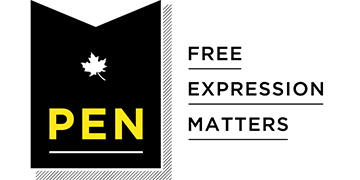Jaclyn Desforges is the 2018 winner of the RBC/PEN Canada New Voices Award for unpublished writers aged 17-30. The award, generously funded by the RBC Emerging Artists Project, includes a $2,000 cash prize and mentorship from a prominent Canadian writer.
We asked Jaclyn a few questions about narrative form, inspiration, and the craft of writing.
1. As the jurors commented, your story slips in and out of a variety of narrative forms weaving a wonderfully detailed structure, how did you come to this style? Is this your usual mode of writing or do you also write straightforward, linear narratives?
The long answer is that I’m actually a poet, not a fiction writer. I don’t really have a typical structure. As a professor in my first MFA course said often, poetry has no rules, only effects. I came to this story with that in mind and decided to structure it like a poem – completely intuitively, based on the images in my mind, without any particular regard for traditional narrative.
I came to this particular structure because the story began as two vignettes about separate characters, which ended up being the scene with Ciara dissociating in the coffee shop and the scene in her bedroom as she ponders Aristotle. I won’t pretend to have had some grand plan – the story mostly appeared in my head fully formed, and I can’t take credit for that. But in some type of non-thinking place it made complete sense for me to tell Ciara’s story of sexual assault and pregnancy in reverse chronological order, interwoven with a made-up fairy tale based on the mating habits of fig wasps.
The short answer is that I’m a little weird, easily bored and I like to shake things up. It doesn’t always work out – I got a lot of pushback in workshop about this story.
2. A-ha! I knew there was something poetic about your story. As a poet, how did you find the transition to fiction? What does fiction permit you that poetry might not, and vice versa? Are there any writers working in both genres whose work you admire?
Maureen Medved, my fiction professor, was very helpful in this regard. Fiction was always a struggle for me because I felt a lot of pressure to write a Proper Short Story, with characters who have traits, who change, who have arcs. And I felt a lot of pressure to put on some sort of authoritative narrative voice. In other words, I was trying to mimic other writers. Maureen suggested that I stop worrying about writing capital-F fiction and start writing vignettes – which I mostly approached as prose poems – and weave them together afterwards. That really opened things up for me, because I saw an opportunity to simply write a short story the way I would write a poem. And that’s where “The Gall” came from.
I think what fiction gives me is the gift of narrative tension. It’s easier to keep a reader’s attention when there is a story involved. It’s the way our brains our wired. So that’s a bit of an edge. I read poetry every day, which I mostly do because it makes my brain feel like it’s getting a really wonderful massage. And still, when I read a book of poetry or lyric prose that includes some form of narrative, like Garments Against Women by Anne Boyer or The Beauty of the Husband by Anne Carson, I’m always shocked at how quickly I’m immersed. Story has a way of pulling us away from reality and into an entirely different consciousness. I’ve always loved that feeling.
What poetry gives me is freedom. As a writer, I’m honestly more interested in the musicality of language, in symbols and layers of meaning, than in character arcs or plot. What I learned writing this story is that I can carry that freedom over into different forms, and that I can bend the rules, or break them entirely, if needed.
3. What brought Aristotle to mind for you in this particular story? What about him, or his work, speaks to yours or Ciara’s experience?
Aristotle came up in my initial research about fig wasps. We know now that the female wasp crawls inside a fig to lay her eggs, which assists with pollination. The eggs then hatch, the male wasps mate with their sisters, and the rest is history. Aristotle, on the other hand, thought that the wasps were being spontaneously generated within the figs. He also believed that while many living things seemed to emerge from rot (maggots, for example), that putrefaction wasn’t actually the source of life, but a byproduct of the elemental conditions required to create life. This mix of facts got me thinking about consent and sexual assault and interiority and the strangeness of bodies, which somehow became this story.
4. You mention the strangeness of bodies, that’s an interesting idea. Do you think in our digital age, where it is easy to have almost our entire lives take place online, that people have forgotten, the “strangeness of bodies”, that is, the joy, the complexity, the grounded, embodied reality of them?
I think people wish they could forget the strangeness of bodies. Maybe we can, at this point, for a little while. We live in a culture of logic and reasonableness and goal-setting, and our bodies have very little interest in any of these things. Motherhood was a big shock for me. I spent 25 years living mostly between my ears and then suddenly my body had other ideas. I remember being nine months pregnant and thinking, Wow, I’ve gotten myself into big trouble here. One way or another, this kid is going to have to come out. Having your body torn open by a human head is a big reminder of how little control we truly have, as much as we try to convince ourselves otherwise. We’re at the mercy of these meat-suits — for now, at least.
But then again, I think the body is the only true source of joy. The world isn’t set up to celebrate or even acknowledge the cyclical nature of embodiment. Our brains tend to like things neat and tidy and linear. I’m a person who, left to my brain’s devices, will work myself to death. Having a preschooler has been good for me. When you take care of a small child, your life automatically starts to coil around the rhythms of the day. You wake up with the sun because they do. You eat breakfast and drink your tea every morning because you’re making breakfast anyway. You play, you rest, you play, you rest. And the objective is what — for your kid to turn eighteen and become a checkmark on your to-do list?
It’s honestly very distressing. Motherhood goes against every goal-oriented bone in my body. But as hardworking as I was before my daughter was born, I couldn’t write. I mean, I could write a blog post for a client about coconut oil, but I had no idea how to write a poem and would probably have been too terrified to try.
I think it’s because creativity isn’t linear either. It’s rhythmic. There are fallow times. I didn’t really get that until I had a baby.
5. It is often said there is no magic or secret sauce to being a writer. You simply have to finish what you start, that there are lots of great, even perfect stories out there that have never been written, not because they haven’t been thought of but because they’ve never been finished; which is to say, to be a writer you must write! Sounds simple, but as many of us know it is not that easy. How do you, as a new mother who is working on an MFA as well as running a company, Nest & Story, find the time to write? Where do you write?
I could give you the practical answer, which is: I got up for a long time at 6:00 a.m. to write. Now I give my kid some sort of brain-melting iPhone app for an hour mid-morning so I can write a poem. And I’ve had various forms of support over the past couple of years – family members, a mother’s helper a couple of days a week, part-time preschool for a while, that sort of thing. But I don’t think that’s really the answer people are looking for.
We all manage to squeeze things into our schedules that can be uncomfortable or unpleasant at times. Somehow most of us manage to do our bookkeeping and taxes. So why do so many people resist a commitment to writing?
The answer is because it’s terrifying. Brutally so. To write is to declare, if only to yourself, that your words are worth something. And for a long time it was easier for me to imagine that someday I’d write, because I could keep up the fantasy that when that moment came, I’d sit down at my desk and brilliance would come pouring out. Spoiler alert, it didn’t.
Before my daughter was born, I had plenty of time to write. Did I write? Of course not. I hid from this desire because it felt so ridiculous and impossible and also easier to manage as an unfulfilled dream. It was only in the middle of the night in the dead of winter with a newborn on one tit that I could dare face it. Exhaustion freed me. I was too tired to be afraid anymore.
I think finding time is easy. Getting rid of fear is hard. How I did it in the beginning was to go to writing workshops similar to the ones I run now, where we’d write around a table together and then read out loud. It wasn’t as scary as writing alone. And when I started writing at home, alone, on my computer instead of one-handed on my iPhone while breastfeeding, I actually had to turn down the brightness of the screen to black so I couldn’t see my own words as I was writing them.
The fear’s still there. Today it’s like, has this all been a fluke? Will I ever write anything good again? The worst thing for me is the advice write every day, no matter what. I think creative work is an act of faith. To put yourself on a tight schedule is to resist any form of faith in yourself to be able to walk away for a while, then to return to creation. I need a few days here and there to absorb the world before I can find anything to write about. I need to fill the well. And every time I walk away and then come back, that part of me that’s afraid gets a little less afraid. I start to trust in myself a little bit more. I think clinging to a schedule is an anxiety-reduction technique that can be helpful at times. But it’s too simple. This is art, it’s not a widget factory. There’s magic to it.




